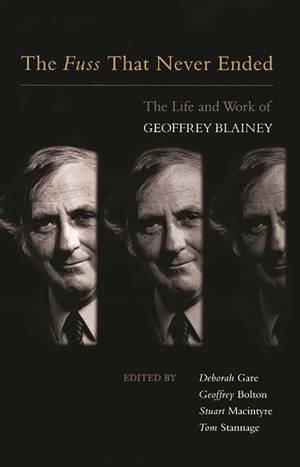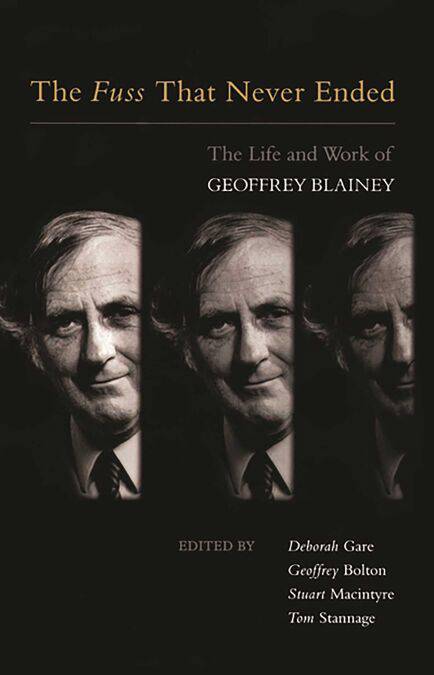
Door een staking bij bpost kan je online bestelling op dit moment iets langer onderweg zijn dan voorzien. Dringend iets nodig? Onze winkels ontvangen jou met open armen!
- Afhalen na 1 uur in een winkel met voorraad
- Gratis thuislevering in België vanaf € 30
- Ruim aanbod met 7 miljoen producten
Door een staking bij bpost kan je online bestelling op dit moment iets langer onderweg zijn dan voorzien. Dringend iets nodig? Onze winkels ontvangen jou met open armen!
- Afhalen na 1 uur in een winkel met voorraad
- Gratis thuislevering in België vanaf € 30
- Ruim aanbod met 7 miljoen producten
Zoeken
Fuss That Never Ended E-BOOK
The Life and Work of Geoffrey Blainey
Deborah Gare, Geoffrey Bolton, Stuart Macintyre, Tom Stannage
E-book | Engels
€ 18,57
+ 18 punten
Uitvoering
Omschrijving
It is time to reassess the work of Geoffrey Blainey, and consider his role in Australian history, politics and public life.
Geoffrey Blainey has steered Australian history into the nation's conversation. No one would dispute that he is a courageous public intellectual, a writer of rare grace and a master storyteller. And he has indeed provoked a rare fuss, both public and professional, with some of his comments on Asian immigration and Aboriginal land rights.
Blainey has challenged the academic history profession, not only with his ideas but also by his practice. A brilliant student, he looked set for Oxford but chose instead the austere west coast of Tasmania for his postgraduate research. For the next decade he earned a living with his pen. And instead of political history in the traditional academic mould, he wrote corporate histories that dispensed with footnotes.
Always probing and speculative, Blainey has dislodged many of the keystones in our understandings of Australia's past. He was one of the first to write about the expansive social history of this land before 1788; he questioned whether Botany Bay was founded primarily as a convict colony; he argued that the Eureka uprising had economic rather than political causes; and he identified sport as a neglected key to the Australian character. His controversial views earned such newspaper headlines as 'Brave Man Set Upon by Thugs for Telling Truth'.
In The Fuss That Never Ended a lively and distinguished assembly of fellow historians—of various ages, interests and political stances—take a fresh look at Blainey's remarkable and sometimes controversial career.
Geoffrey Blainey has steered Australian history into the nation's conversation. No one would dispute that he is a courageous public intellectual, a writer of rare grace and a master storyteller. And he has indeed provoked a rare fuss, both public and professional, with some of his comments on Asian immigration and Aboriginal land rights.
Blainey has challenged the academic history profession, not only with his ideas but also by his practice. A brilliant student, he looked set for Oxford but chose instead the austere west coast of Tasmania for his postgraduate research. For the next decade he earned a living with his pen. And instead of political history in the traditional academic mould, he wrote corporate histories that dispensed with footnotes.
Always probing and speculative, Blainey has dislodged many of the keystones in our understandings of Australia's past. He was one of the first to write about the expansive social history of this land before 1788; he questioned whether Botany Bay was founded primarily as a convict colony; he argued that the Eureka uprising had economic rather than political causes; and he identified sport as a neglected key to the Australian character. His controversial views earned such newspaper headlines as 'Brave Man Set Upon by Thugs for Telling Truth'.
In The Fuss That Never Ended a lively and distinguished assembly of fellow historians—of various ages, interests and political stances—take a fresh look at Blainey's remarkable and sometimes controversial career.
Specificaties
Betrokkenen
- Auteur(s):
- Uitgeverij:
Inhoud
- Aantal bladzijden:
- 234
- Taal:
- Engels
Eigenschappen
- Productcode (EAN):
- 9780522863680
- Verschijningsdatum:
- 17/04/2013
- Uitvoering:
- E-book
- Beveiligd met:
- Adobe DRM
- Formaat:
- ePub

Alleen bij Standaard Boekhandel
+ 18 punten op je klantenkaart van Standaard Boekhandel
Beoordelingen
We publiceren alleen reviews die voldoen aan de voorwaarden voor reviews. Bekijk onze voorwaarden voor reviews.











